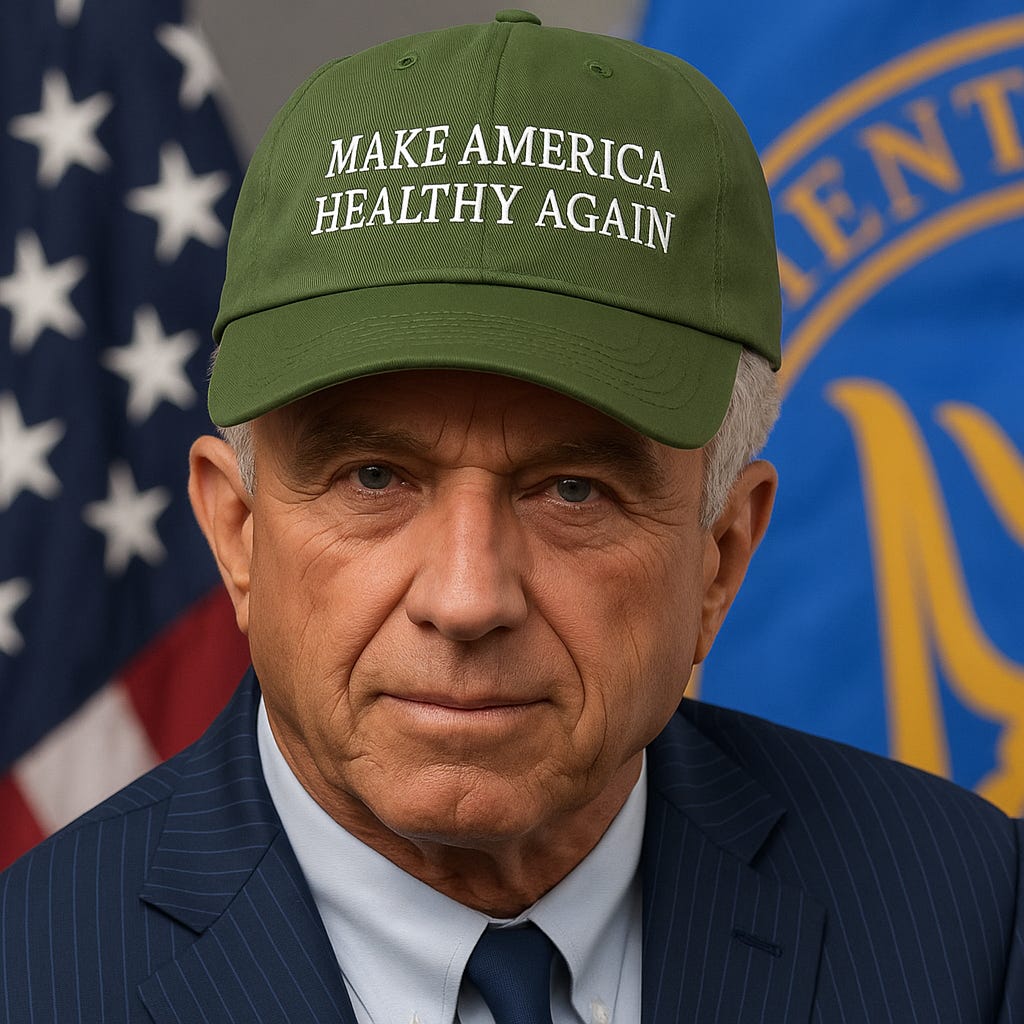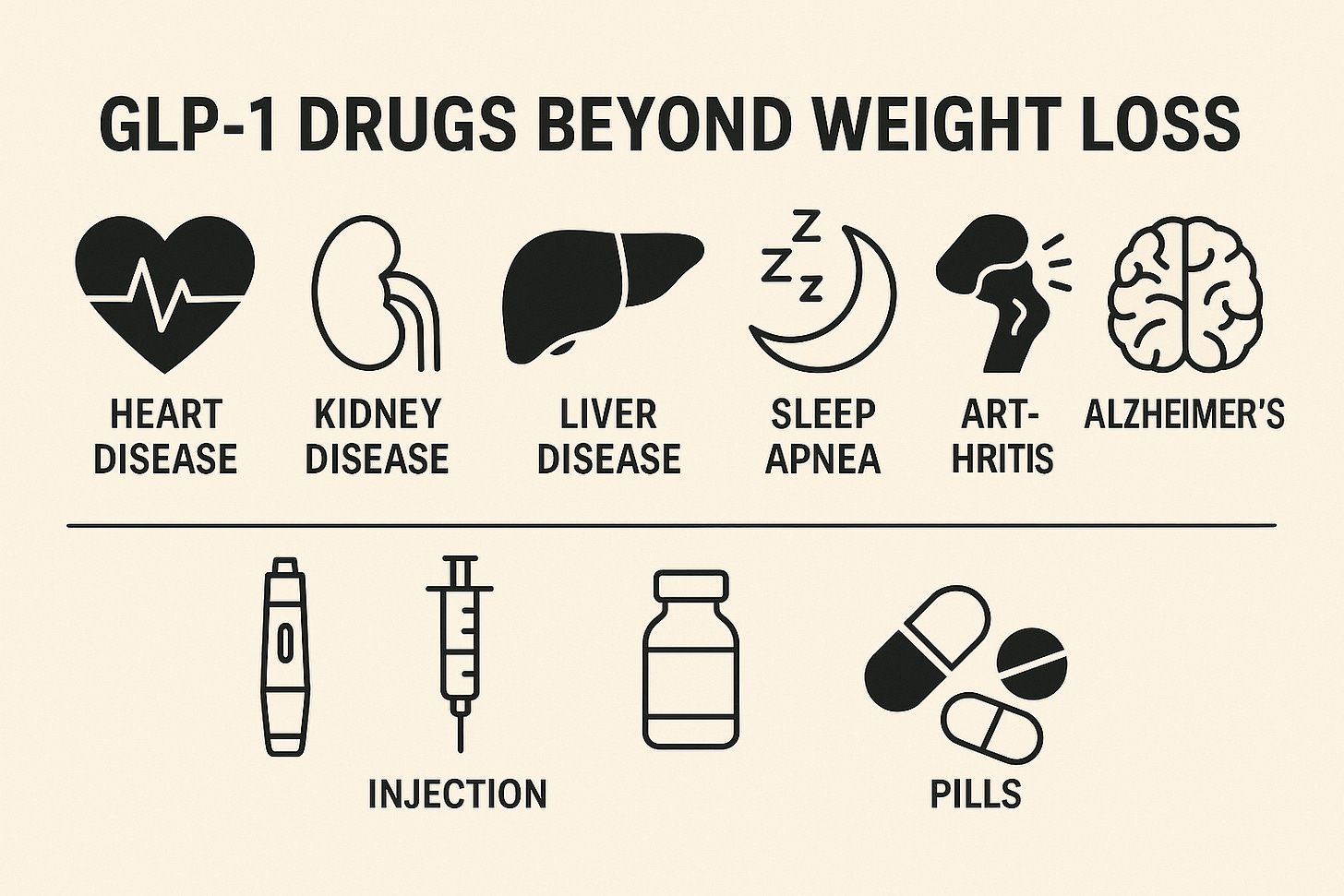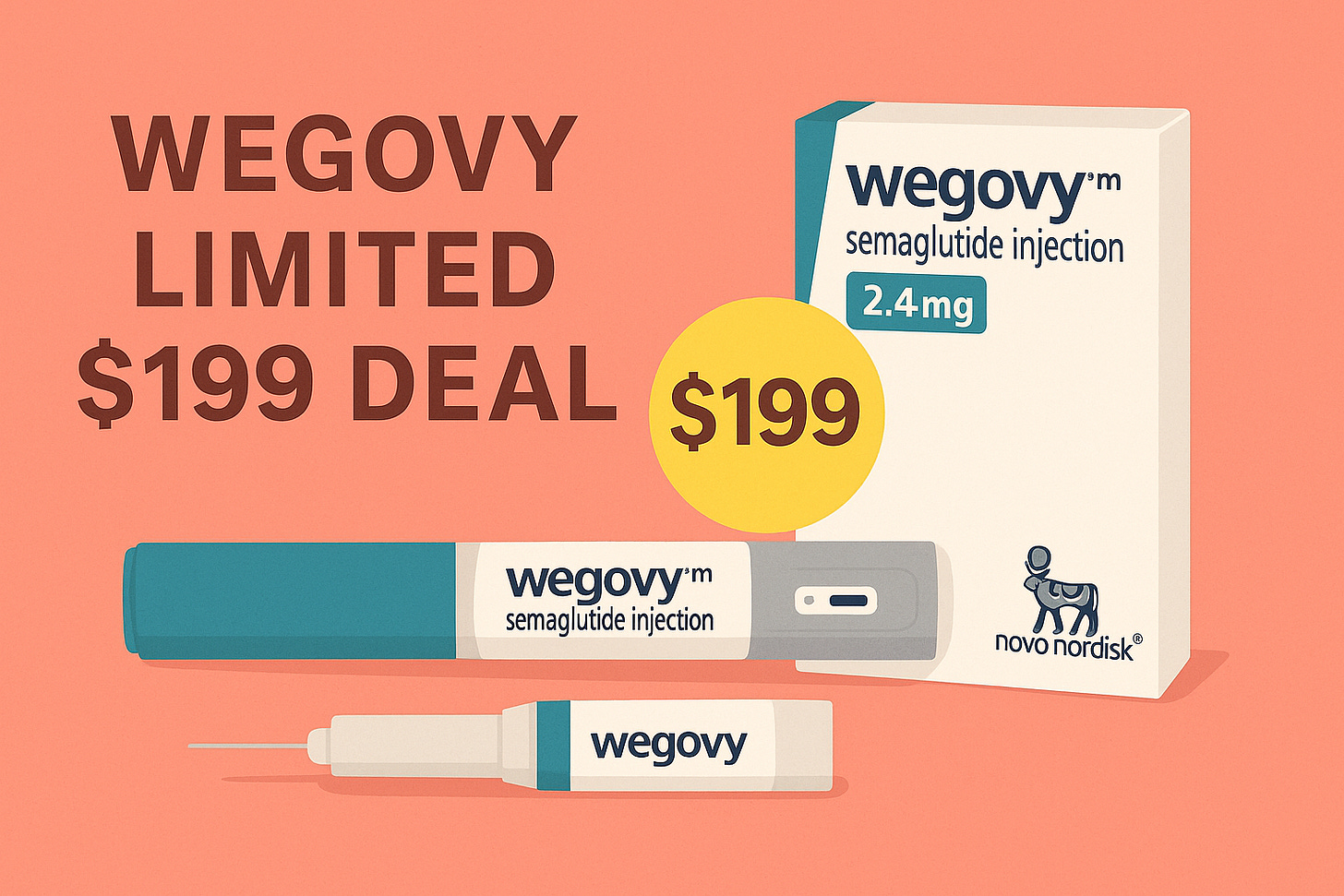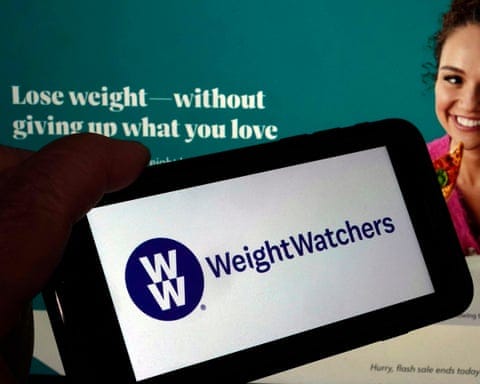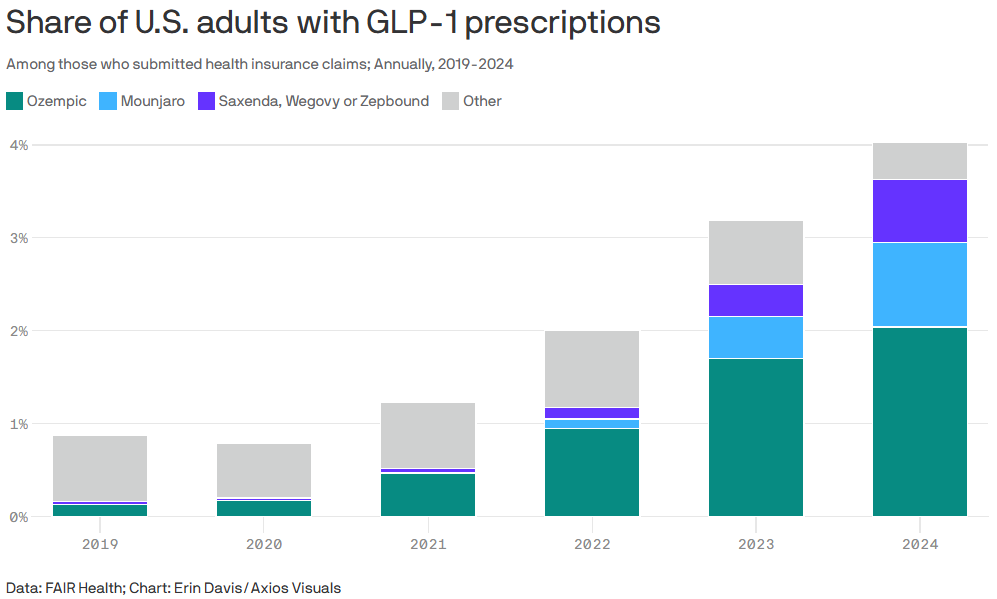The Gut Punch Weekly #22
MAHA report calls for broad food & health shakeup, Doctors See Broad Medical Uses for GLP-1s, Wegovy Offers Limited $199 Deal, and more!
Top Stories
1) MAHA Report Urges Reassessment of Vaccines, Foods, and Pesticides
The first MAHA health report, led by Robert F. Kennedy Jr., calls for comprehensive reassessment of the safety of childhood vaccines, processed foods, and widely used pesticides, citing their possible contribution to rising chronic illnesses in America.
The commission recommends new independent studies on vaccine schedules, pharmaceutical use in children, and the health effects of food additives and agricultural chemicals.
The report calls out industry lobbying and 'corporate capture' of food and health agencies, suggesting that pharmaceutical money strongly influences congressional legislation and FDA operations.
Concerns have been raised by farmers, food manufacturers, and some Republican lawmakers about the report's implications for the American food supply and agricultural practices.
The administration plans to develop concrete policy recommendations within the next 100 days.
(CNN)
2) Doctors See Broad Medical Uses for GLP-1 Drugs
GLP-1 drugs like Ozempic are showing promise for treating a wide range of conditions beyond diabetes and weight loss.
Conditions include heart, kidney, and liver diseases, sleep apnea, arthritis, Alzheimer's, and even alcohol addiction.
Pharmaceutical companies are developing newer GLP-1 drugs that could offer greater weight loss benefits and more convenient pill forms, which may help increase adoption rates in the future.
Doctors estimate that up to one-third of adults could potentially benefit from these drugs.
(WSJ)
3) Wegovy Offers Limited $199 Deal Amid Compounding Ban
Novo Nordisk is offering a temporary $199 price for a one-month supply of Wegovy through June 30, aimed at patients losing access to cheaper compounded versions as a federal ban takes effect.
The discount targets uninsured or self-paying customers, but the price will revert to $499 after the promotional period ends.
The ban on compounded GLP-1 drugs, along with the reluctance of many insurers to cover GLP-1s for obesity, is significantly limiting patient access to treatment.
GLP-1 Industry Intel
Cigna Evernorth Caps GLP-1 Drug Costs at $200 Monthly: Cigna's Evernorth announced a new pharmacy benefit management program that caps monthly out-of-pocket costs for GLP-1 drugs Wegovy and Zepbound at $200, potentially saving patients up to $3,600 annually.
Novo Nordisk Embraces Telehealth for GLP-1 Marketing: After battling telehealth companies over compounded GLP-1 medications, Novo Nordisk has pivoted to partnering with telehealth companies like Ro and LifeMD to offer Wegovy at lower prices.
LifeMD Offers $299 Wegovy Bundle for Self-Pay Patients: LifeMD and Novo Nordisk launched a $299 introductory bundle for self-pay patients, which includes Wegovy along with a virtual weight loss program.
Food & Wellness Industry Intel
WeightWatchers Pivots from Dieting to Weight-Loss Medications: After filing for bankruptcy and losing Oprah Winfrey as a shareholder, WeightWatchers is transforming its business model by collaborating with CheqUp to offer support services for patients using weight-loss medications
GLP-1 Drugs Drive New Era of Protein Innovation: GLP-1 weight loss drugs are transforming appetites and driving innovation in protein-rich foods reshaping what, how, and why people eat protein across the food industry.
Ozempic Users Report Reduced Beef, Increased Plant-Based Intake: A University of Arkansas study reveals that GLP-1 drug users significantly reduce their beef and processed food intake while plant-based alternatives see minimal decline in consumption.
Millers Shift to Nutrient-Dense Products for GLP-1 Users: As GLP-1 adoption grows, flour manufacturers are developing fiber-rich, protein-enhanced products to meet GLP-1 patients' nutritional needs.
Frontline Focus
GLP-1 Drug Use Surges 600% in Six Years: GLP-1 drug use for weight loss and diabetes has surged nearly 600% in six years, with 4% of Americans now using these medications and bariatric surgery rates declining. GLP-1 drug use for weight loss and diabetes has surged nearly 600% in six years with 4% of Americans now using these medications and bariatric surgery rates declining.
Microdosing Weight-Loss Drugs Raises Safety Concerns: Some people are microdosing GLP-1 weight-loss drugs to save money or reduce side effects, but doctors warn this DIY approach is risky and not supported by research.
Poison Control Reports Surge in GLP-1 Drug Calls: Poison control centers in Pennsylvania and New Jersey report a sharp rise in exposure calls linked to popular GLP-1 weight-loss drugs, driven by side effects, dosing errors, and counterfeit products.
Influencer Faces Backlash After Hiding GLP-1 Weight Loss: Weight loss influencer Janelle Rohner faces heavy backlash for peddling a $200 weight-loss course without revealing that her weight loss was aided by GLP-1 medication
Insurers Struggle with Soaring Demand for GLP-1 Drugs: Major insurers like CVS, Cigna, and UnitedHealthcare are developing specialized programs and partnerships to manage the growing demand for GLP-1 weight loss drugs while controlling costs, which are expected to reach $100 billion by 2030.
Insurance Barriers Limit Access to Weight Loss Drugs: Insurance companies are increasingly restricting coverage of GLP-1 drugs due to cost, forcing patients and doctors to navigate complex alternative payment options.
GLP-1 Clinical Insights
GLP-1 Diabetes Drugs Linked to Lower Cancer Risk: New data reveals that diabetes medications like Ozempic could offer modest protection against obesity-related cancers, showing particular promise in reducing colorectal cancer cases by 16-28%.
GLP-1 Weight Loss Drugs Linked to 19 Neurological Effects: A comprehensive analysis of FDA adverse event reports reveals significant neurological side effects linked to GLP-1 medications, including dizziness, tremors, and taste disorders
GLP-1 Weight Loss Drugs Show No Psychiatric Risk: A comprehensive review of over 100,000 participants found that GLP-1 RAs for weight loss or diabetes don't increase psychiatric risks and may improve quality of life in people without pre-existing mental illness.
GLP-1 Agonists May Prevent Weight Gain After Quitting Smoking: A meta-analysis of three trials suggests GLP-1 receptor agonists may help prevent post-smoking-cessation weight gain, though their impact on quit rates remains unclear.
GLP-1 Drugs Linked to Dry Mouth and Taste Changes: GLP-1 drugs like Ozempic may cause dry mouth, dental problems, and taste changes due to decreased saliva production and altered taste perception. GLP-1 drugs like Ozempic may cause dry mouth, dental problems, and taste changes
The Bleeding Edge
Engineered Albumin Improves GLP-1 Drug Delivery and Efficacy: Engineered human albumin with improved FcRn binding extends the half-life and efficacy of fused GLP-1 drugs, overcoming reduced stability from enzymatic cleavage of albumin's C-terminal end.



